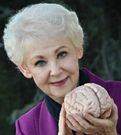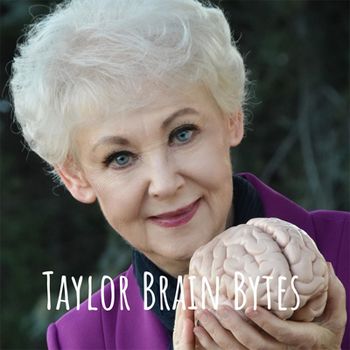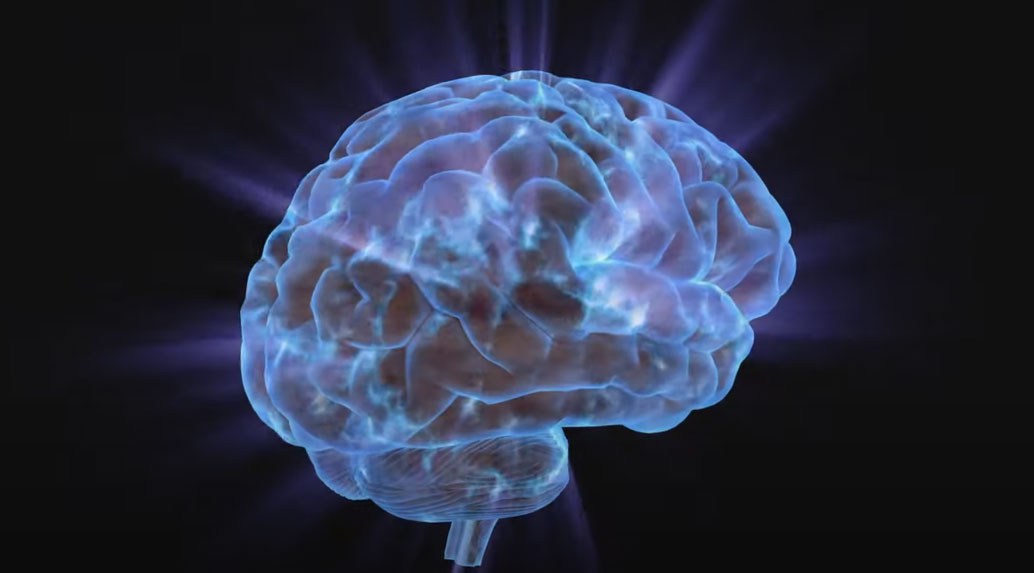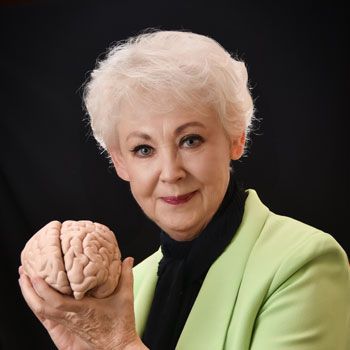A Brain-Friendly Lifestyle
©Arlene R. Taylor PhD www.arlenetaylor.org
The doctor of the future will give no medicine, but will interest her or his patients in the care of the human frame, in a proper diet, and in the cause and prevention of disease.
—Thomas Alva Edison (1847-1931)
 “My girlfriend says I’m not taking care of my brain or my immune system,” he said. “She suggested I come and talk with you.” His physique showed strength and resistance training, but his skin was sallow and there were dark circles under his eyes. “I’m not opposed to...” His voice trailed off. “Truth is,” he continued, looking at the floor, “I have no idea what a brain-friendly lifestyle looks like. And then there’s something for the immune system, too?”
“My girlfriend says I’m not taking care of my brain or my immune system,” he said. “She suggested I come and talk with you.” His physique showed strength and resistance training, but his skin was sallow and there were dark circles under his eyes. “I’m not opposed to...” His voice trailed off. “Truth is,” he continued, looking at the floor, “I have no idea what a brain-friendly lifestyle looks like. And then there’s something for the immune system, too?”
“I love it when people are honest,” I said, smiling at his basically nice features while he gazed out the window. “You can only know what you’ve learned. The good news is that your brain and immune system together constitute the most powerful healing system in the world. Moreover, what’s good for the brain is generally good for the immune system, and vice versa.”
He seemed to perk up at my response. “So if I learn one set of strategies it’ll cover both?”
“Pretty much,” I replied. “No doubt you could describe the strategies in many different ways. My bottom line is a baker’s dozen.”
“Can I record this?” the young man asked, taking out his iPad. “It’s a pile easier than taking notes.” He was right.
#1 – Live a Positive Mindset
If you have an enemy outpost of negativityinside your head, get rid of it and develop a positive mindset. Learn to think and speak to yourself and others in an affirming style. Be serious about life but not too serious. Tell yourself helpful, hopeful, and empowering stories that will help you live a happy, productive, meaningful life.
#2 – Drink Plenty of Water
Estimates are that the majority of Americans over the age of 50 are dehydrated. That’s unfortunate because dehydration is a major contributor to an increased production of free-radicals and premature aging. Some symptoms of dis-ease may decrease as you begin drinking more water—drink enough to get two very pale urines per day (unless you have a medical condition that requires the limitation of fluids).
#3 – Brain Breathe Every Day
Air provides oxygen that is critical to life and brain function. Using abdominal muscles, inhale deep breaths of fresh, clean air several times a day and try to increase your lung capacity. Breathe in through your nose to a count of four, hold your breath for a count of twelve, and breathe out through pursed lips to a count of eight. Avoid side-smoke (e.g., tobacco products), vehicle exhaust, and air pollution whenever possible, and change furnace and AC filters on a regular basis.
#4 – Exercise Regularly
Shed the couch-potato routine. Exercise (dubbed a general antioxidant) is critically important to both brain and immune system. A 15-minute walk in nature has been found to decrease levels of cortisol, the stress hormone. Walking indoors does not have the same effect. Include aerobic, balance, strength, and endurance exercises in your weekly program. As one physician put it, “I exercise only on specific days of the week¾on the days I eat.”
#5 – Flood Your Home with Sunlight
Plants cannot survive without sunlight; neither can you. Everyone needs exposure to natural light, some even more than others. Obtain moderate exposure to natural light, indoors as well as outdoors. Flood your home with sunlight, but bask in it with extreme caution. Many health care professionals now recommend avoiding sunburn, tanning parlors, and exposure to ultraviolet light, some studies connecting those modalities to suppressed immune function.
#6 – Eat Well
Eating well encompasses what you eat, when, and how much, as well as mindset and speed of eating. Eat foods in as natural a state as possible and minimize refined sugar (limit yourself to two bites of dessert) and beverages (avoid colas and soft drinks). Read labels and avoid anything ending in “ate,” e.g., Monosodium Glutamate. Current suggestions include moving toward a Mediterranean style of eating and embracing intermittent fasting once or twice a week. The American Commission on anti-aging recommends taking a Green Super Food every day.
#7 – Get Enough Sleep
Sleep deprivation can drain your energy, accelerate the onset of symptoms of aging, and suppress both the immune system and brain function. Twenty hours without sleep and your brain is functioning at the legal limit of alcohol intoxication in the State of California. During sleep, cells produce substances that support neurons and neurotransmitters. Each brain requires an optimum amount of sleep. Get the sleep that allows you to thrive. If you were an hour short of sleep last night, try to grab a 15 minute nap sometime during the day.
#8 – Take Time to Play
All work and no play makes for deadly, dull, dreary, and boring. The brain loves variety; a change can be as good as a rest. Take a mini-vacation, alternate activities, pursue hobbies, travel. While play may be the “work” of children; it’s the elixir of youth for adults. On a regular basis, schedule opportunities for your unique version of play and relaxation. Do what works for your brain, no matter if it differs from what others consider to be play.
#9 – Manage Your Stressors
Stress is part of living: the absence of stress is death. The brain is the first body system to recognize a stressor. It reacts with split-second timing and can stimulate the stress response for up to 72 hours after a traumatic event (real or imagined), even longer if you keep rehearsing the event. Unmanaged or chronic stress can suppress both the brain and immune system function. High levels of the stress hormone cortisol can kill neurons in the hippocampus, the brain’s search engine.
#10 – Hone Your Emotional Intelligence [EQ]
Many approach emotions and feelings from the perspective of the attitudes and beliefs absorbed prior to the age of five. How about you? While you are not always responsible for every emotion that surfaces, you need to take responsibility for your feelings (since you create and maintain them) and for the behaviors you choose to exhibit. Give up worry and anxiety. It was Winston Churchill who said, “I had a lot of trouble in my life¾most of which never happened.”
#11 – Choose a Support System Carefully
Humans are relational beings. Each person needs a core group of individuals with whom to share interests, connection, and encouragement. Some even need their help to remain accountable. Select people who have similar high-level-healthiness goals, practice maintaining a positive mindset, and hone and use a sense of humor. Remember that those who have and interact with a nurturing support system of carefully selected individuals generally are healthier, happier, and longer-lived than those who don’t.
#12 – Hone Your Spirituality
Spirituality encompasses the spirit in which you live life, including the following:
- ethical/moral choices,
- your personal life vision,
- a sense of gratitude,
- the recognition of a meaning to existence that transcends immediate circumstances,
- whatever evokes “awe,” and
- goals that help achieve the highest possible levels of brain-body health and wellness.
According to an old proverb, a grateful heart nourishes the bones. Studies have shown that health and spirituality are connected. For example, the bodies of runners who meditated while exercising functioned more effectively. Also, individuals who regularly attended religious gatherings had fewer illnesses than those who did not.
#13 – Live the 20:80 Rule
The last strategy comes from Epictetus, a 2nd century Greek philosopher, who taught that it isn’t so much what happens to you that matters as what you think about what happens to you. In this 21st Century you could state it this way: 20% of the negative effect to your brain and body is due to the event; 80% comes from your perception of the event and the spin you put on it. You can do everything about the 80%.
“Well that’s certainly simple and straight forward,” said the young man. “I thought you were going to give me a list of difficult things to do.”
“High-level-healthiness is simple,” I replied, "but not necessarily easy. The whole world would be on board if you could just wiggle your pinkie, make it all happen, and stay consistent!” He laughed.
“The brain and immune system work hand-in-glove to help prevent you from getting sick. And if you do fall ill, they were designed to heal you. Estimates are that at least 85% of all illnesses are within the brain’s and immune system’s capability of healing. You have a role, however. You can make it easier or more difficult for that to happen. Living a brain-friendly lifestyle can make it easier. Begin implementing these strategies now, a little at a time, and before you know it you will have a brain-friendly lifestyle nailed.”
“I’m on it,” he said, shutting down his iPad. “I’ve heard it said that prevention is better than cure!”
Again, he was right.




